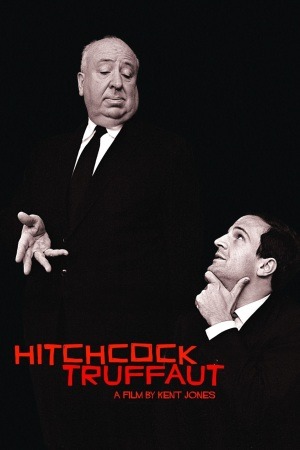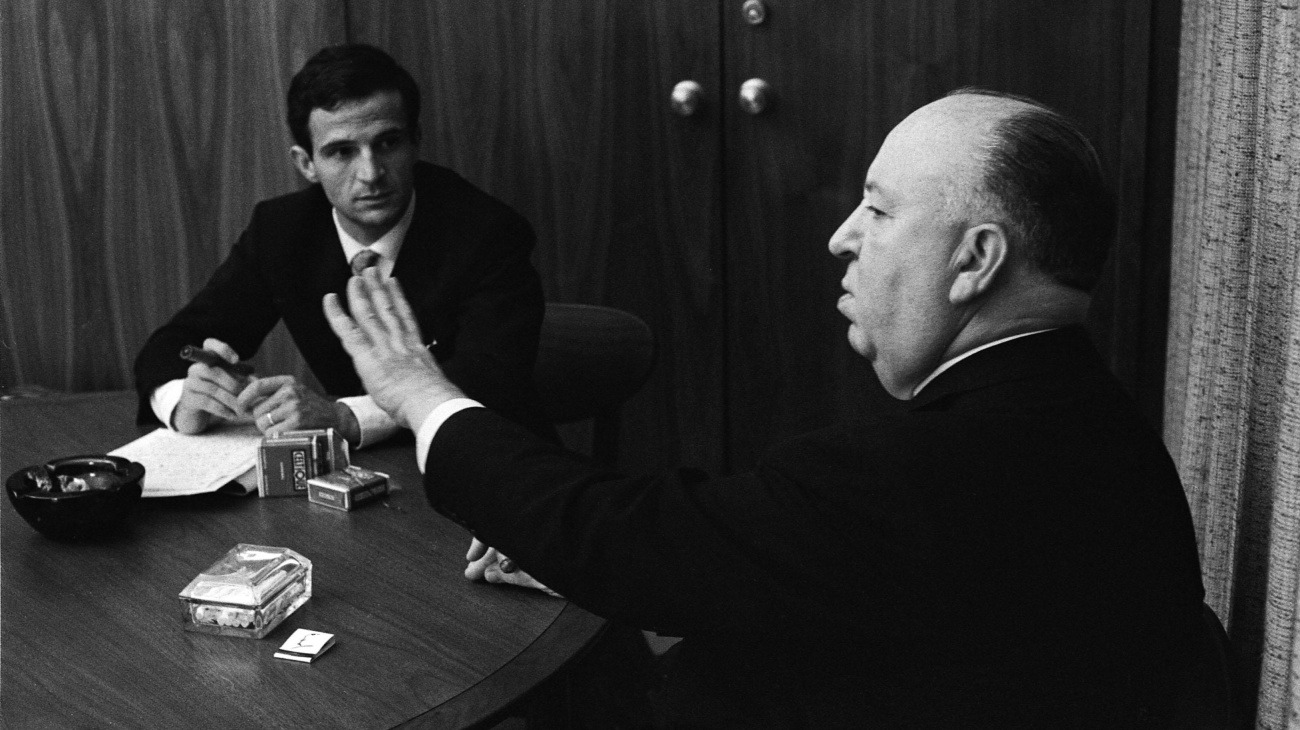
A review in brief
The admittedly ungenerous first response I had to Kent Jones's lovingly fussed-over Hitchcock/Truffaut is that it's extraordinarily inessential. The famous, one-of-a-kind book length interview, conducted in 1962 and published in 1966, between film directors Alfred Hitchcock and François Truffaut is, to begin with, much too long and full of far too many musings to be effectively stuffed into a fairly short documentary, and insofar as it's even trying to do that, the film functions solely as a sort of Greatest Hits compendium. Secondly, it's possible (and perhaps even probable) that Alfred Hitchcock is the most thoroughly-analyzed film director in the history of the medium, with every interesting facet of his major films worked out in multiple places by multiple critics, and even his minor films largely picked over as well. For a film to attempt, in just 79 minutes, to add to that, is crazed madness.
The good news first, then, is that Hitchcock/Truffaut is not, in fact, trying to add anything. The film sets its sights much lower than that, and ends up aiming at probably the best single target that a documentary about a specific filmmaker's technique could ever select. Basically, we have here a collection of some of the most important (often the most famous, sometimes not) observations and analyses about Hitchcock's films, themes, and techniques, which are applied in real time to the sequences in questions. The key shot from Notorious is dissected while we watch it play out. The shower scene from Psycho, the same. The makeover scene from Vertigo, ditto.
It occurred to me only while watching the film, that for all I've ready minute discussions of these moments, I've never done so in tandem with watching them play out. This is the casual brilliance of Hitchcock/Truffaut: it functions as an academic audio commentary for whole bunch of films all at once and provides a potted summary of Hitchcock's career simultaneously. It's like getting the greatest hits of the discussion section from a college course on the director bound in a tidy 79-minute package, as led by a uniquely enthusiastic instructor.
As a result, the film serves two primary functions, that I can tell: first, it provides a pitch-perfect starter guide to what you should think about when watching Hitchcock films. While it's possibly unlikely that anybody would find their way to this documentary without having at least some familiarity with the Hitchcock canon, for that theoretical neophyte, this is exactly the cheat sheet I'd want them to have in hand. The other function is to slap a fresh coat of paint on the overfamiliar key moments throughout Hithcock's career in sound cinema (it generously recaps everything from The Lady Vanishes to Family Plot, not always stressing what you'd expect - North by Northwest, for example, is largely glossed over), reminding even the most bored viewer of just how creative the director's work was relative to everything being produced around it. It's a high-impact argument in favor of Hitchcock as a one-of-a-kind formal genius, one that made me, at least, more eager to revisit his films than I have been in a very long time. It's not in-depth criticism, but as an unabashedly fannish appreciation of a genius, it's pretty infectious and great.
The good news first, then, is that Hitchcock/Truffaut is not, in fact, trying to add anything. The film sets its sights much lower than that, and ends up aiming at probably the best single target that a documentary about a specific filmmaker's technique could ever select. Basically, we have here a collection of some of the most important (often the most famous, sometimes not) observations and analyses about Hitchcock's films, themes, and techniques, which are applied in real time to the sequences in questions. The key shot from Notorious is dissected while we watch it play out. The shower scene from Psycho, the same. The makeover scene from Vertigo, ditto.
It occurred to me only while watching the film, that for all I've ready minute discussions of these moments, I've never done so in tandem with watching them play out. This is the casual brilliance of Hitchcock/Truffaut: it functions as an academic audio commentary for whole bunch of films all at once and provides a potted summary of Hitchcock's career simultaneously. It's like getting the greatest hits of the discussion section from a college course on the director bound in a tidy 79-minute package, as led by a uniquely enthusiastic instructor.
As a result, the film serves two primary functions, that I can tell: first, it provides a pitch-perfect starter guide to what you should think about when watching Hitchcock films. While it's possibly unlikely that anybody would find their way to this documentary without having at least some familiarity with the Hitchcock canon, for that theoretical neophyte, this is exactly the cheat sheet I'd want them to have in hand. The other function is to slap a fresh coat of paint on the overfamiliar key moments throughout Hithcock's career in sound cinema (it generously recaps everything from The Lady Vanishes to Family Plot, not always stressing what you'd expect - North by Northwest, for example, is largely glossed over), reminding even the most bored viewer of just how creative the director's work was relative to everything being produced around it. It's a high-impact argument in favor of Hitchcock as a one-of-a-kind formal genius, one that made me, at least, more eager to revisit his films than I have been in a very long time. It's not in-depth criticism, but as an unabashedly fannish appreciation of a genius, it's pretty infectious and great.
Categories: documentaries, movies about movies






